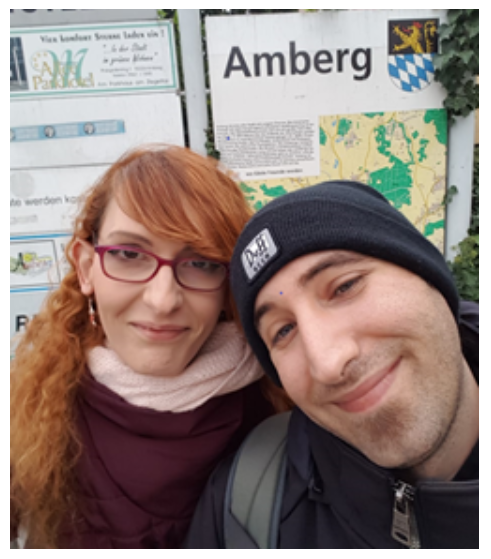When Sara applied to EURES Germany’s international qualification project, she had never worked in geriatric care. “I was at a time in my life when I needed a radical change,” she shares. “I was attracted to the geriatric care profession. The idea of being able to help people who cannot stand on their own seemed beautiful to me.”
“Speed dating” interviews
The first step for Sara was to take part in speed-dating-style interviews with nine geriatric care facilities in Amberg, Bavaria. During the interviews, EURES Adviser Carmen Kräutner provided translation support. One of the key people behind the project, Carmen has a close relationship with EURES Spain thanks to her bilingual background.
“I enjoy supporting mobility and helping to create a win-win situation for jobseekers, employers and – when we are talking about geriatric care – society,” Carmen says.
Sara settles into life in Germany… and meets Aitor
After securing a job offer, Sara did a beginner’s German language course in Spain before moving to Germany for an integration course in February 2019. She also received financial support to cover her travel costs. Sara was soon settled in Amberg and it was here that she met Aitor, her future partner. Aitor had previously worked in geriatric care in his native Spain, but he was mostly on temporary contracts and his situation lacked stability.
When he heard about EURES Germany’s project through the Spanish public employment service, Aitor decided to join a speed dating event in Bavaria. Like Sara, he received financial support to cover travel and language course costs.
After moving to Amberg, where he now shares a flat with Sara, Aitor began working at the Phönix Lebenszentren care home while undertaking a vocational training course.
Sara is now in the second year of her three-year Ausbildung, in which she combines her work at the Seniorenheim der Diakonie nursing home with part-time nursing studies. “It is quite difficult, especially when studying in a language that is not your own, but I consider it a worthwhile challenge,” she says.
“We are still very happy, motivated and grateful”
Over the past year, the geriatric care sector has been heavily affected by COVID-19. Naturally, Sara says this has been a stressful period for staff. Her studies were also interrupted due to the restrictions, although the classes have since resumed online.
Aitor’s Ausbildung was interrupted too, but he has recently been participating in an online integration course to improve his German and hopes to resume his training soon.
Despite these inevitable difficulties, both Sara and Aitor are determined to continue with their training and take advantage of further opportunities on offer in their sector in Germany.
“We are still very happy, motivated and grateful to have been able to come here to Germany to live and work,” Sara says. “It’s another culture, another country, another language, and you have to adapt to everything, but we are continuing with our plans to work and train here.”
More speed dating planned for summer
EURES Germany’s project has continued during the pandemic. The two most recent recruitment rounds took place online, but the project has stuck to its trusted format by organising virtual speed dating.
A group of 18 successful candidates from Italy and Spain arrived in Bavaria to begin jobs in February and a further 90 candidates are currently completing German language courses in their home countries. They will start work in September.
Carmen and her fellow EURES Advisers Carmen Allabar and Kim Prade are now looking to extend the project beyond Bavaria and are already in discussion with an employer in Thuringia.
Meanwhile, they are also organising speed dating for another 90 vacancies in the project’s sixth recruitment round, due to take place in June or July.
If you are interested in participating in this project, contact the team at ZAV [dot] Regionenteam-Suedwesteuropa arbeitsagentur [dot] de (ZAV[dot]Regionenteam-Suedwesteuropa[at]arbeitsagentur[dot]de).
arbeitsagentur [dot] de (ZAV[dot]Regionenteam-Suedwesteuropa[at]arbeitsagentur[dot]de).
If you are interested in learning about other opportunities in Germany, contact zav arbeitsagentur [dot] de (zav[at]arbeitsagentur[dot]de).
arbeitsagentur [dot] de (zav[at]arbeitsagentur[dot]de).
Read more:
Find EURES Advisers
Living and working conditions in EURES countries
EURES Jobs Database
EURES services for employers
EURES Events Calendar
Upcoming Online Events
EURES on Facebook
EURES on Twitter
EURES on LinkedIn
Details
- Publication date
- 12 April 2021
- Authors
- European Labour Authority | Directorate-General for Employment, Social Affairs and Inclusion
- Topics
- EURES best practice
- Labour market news / mobility news
- Success stories
- Youth
- Sector
- Human health and social work activities
